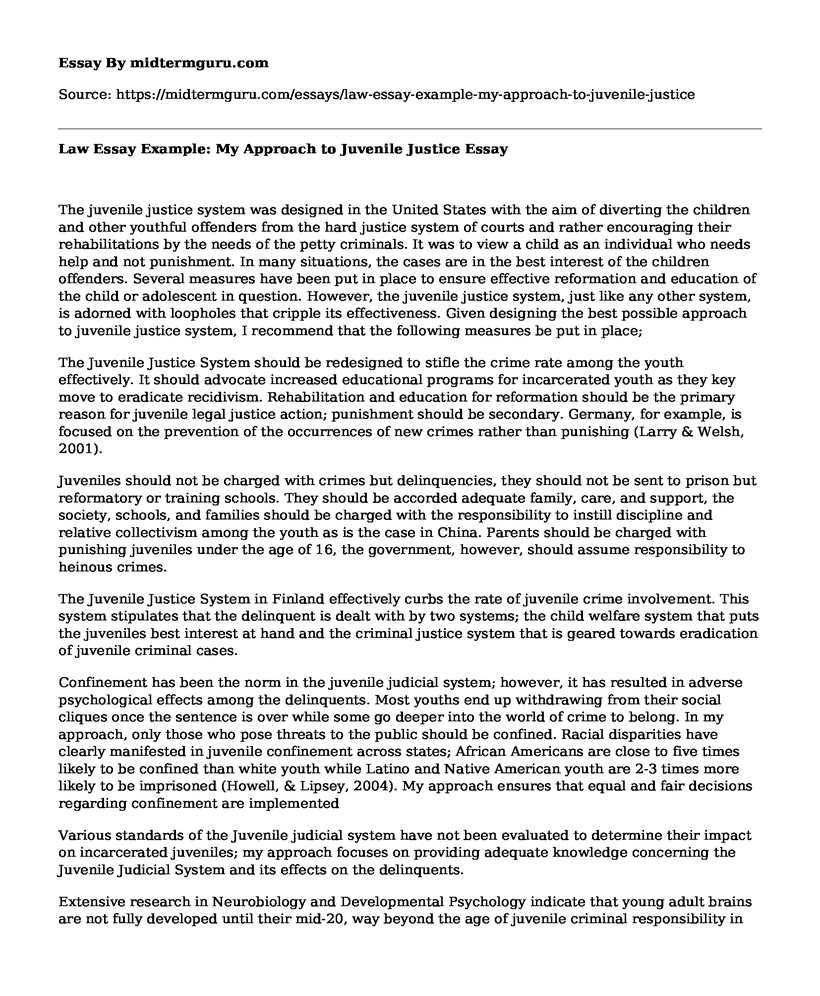The juvenile justice system was designed in the United States with the aim of diverting the children and other youthful offenders from the hard justice system of courts and rather encouraging their rehabilitations by the needs of the petty criminals. It was to view a child as an individual who needs help and not punishment. In many situations, the cases are in the best interest of the children offenders. Several measures have been put in place to ensure effective reformation and education of the child or adolescent in question. However, the juvenile justice system, just like any other system, is adorned with loopholes that cripple its effectiveness. Given designing the best possible approach to juvenile justice system, I recommend that the following measures be put in place;
The Juvenile Justice System should be redesigned to stifle the crime rate among the youth effectively. It should advocate increased educational programs for incarcerated youth as they key move to eradicate recidivism. Rehabilitation and education for reformation should be the primary reason for juvenile legal justice action; punishment should be secondary. Germany, for example, is focused on the prevention of the occurrences of new crimes rather than punishing (Larry & Welsh, 2001).
Juveniles should not be charged with crimes but delinquencies, they should not be sent to prison but reformatory or training schools. They should be accorded adequate family, care, and support, the society, schools, and families should be charged with the responsibility to instill discipline and relative collectivism among the youth as is the case in China. Parents should be charged with punishing juveniles under the age of 16, the government, however, should assume responsibility to heinous crimes.
The Juvenile Justice System in Finland effectively curbs the rate of juvenile crime involvement. This system stipulates that the delinquent is dealt with by two systems; the child welfare system that puts the juveniles best interest at hand and the criminal justice system that is geared towards eradication of juvenile criminal cases.
Confinement has been the norm in the juvenile judicial system; however, it has resulted in adverse psychological effects among the delinquents. Most youths end up withdrawing from their social cliques once the sentence is over while some go deeper into the world of crime to belong. In my approach, only those who pose threats to the public should be confined. Racial disparities have clearly manifested in juvenile confinement across states; African Americans are close to five times likely to be confined than white youth while Latino and Native American youth are 2-3 times more likely to be imprisoned (Howell, & Lipsey, 2004). My approach ensures that equal and fair decisions regarding confinement are implemented
Various standards of the Juvenile judicial system have not been evaluated to determine their impact on incarcerated juveniles; my approach focuses on providing adequate knowledge concerning the Juvenile Judicial System and its effects on the delinquents.
Extensive research in Neurobiology and Developmental Psychology indicate that young adult brains are not fully developed until their mid-20, way beyond the age of juvenile criminal responsibility in the United States. My approach focuses on raising the juvenile age limit to older than 18 preferably 21, this approach aims to effectively attend to criminal cases. Germany, for instance, uses this strategy in their Juvenile Judicial System and it has worked effectively in reducing the rate of juvenile criminal activities.
Germany has also incorporated alternative treatments into their Juvenile Judicial System. Among these treatments are; social training and aggression management courses, offenders also meet their victims and are guided into realizing their crimes and taking responsibility for their actions (Howell, & Lipsey, 2004). My approach is aimed at incorporating these alternative treatments since they play a fundamental role in reforming the incarcerated youth.
Different states and countries have put in place various measures with the view of curbing juvenile criminal activities. Most of these measures have proved effective and have played a great role in reforming the incarcerated youth. However, some of these reforms are disadvantageous and significantly affect the life of the delinquents in question. These measures are not suitable for my approach to a revamped Juvenile Judicial System. They include;
Inadequate resource allocation and ignorance to the living conditions of juvenile detainees in Padamba Rd, Freetown Sierra Leone is one disheartening practice in their Juvenile Judicial System. Male juvenile inmates are most of the times cramped up together with male adult detainees resulting in sexual harassment and bullying. The needs and rights of such juvenile inmates are ignored.
Zero tolerance in schools has increased the number of youths facing detention, youths that commit minor offenses knowingly and unknowingly overwhelm detention centers and training schools. Such minor offenses would have otherwise been dealt with by the parents or school authority.
Low-income youth, the youth of color and those with disabilities have been overrepresented in the judicial system of most states. This practice has consequently led to increased criminal engagement among the minority groups.
References
Larry, S. & Welsh, B. (2001). Juvenile Delinquency theory practice and the law (1st ed.). Wadsworth.
Howell, J. & Lipsey, M. (2004). A Practical Approach to Evaluating and Improving Juvenile Justice Programs. Juvenile And Family Court Journal, 55(1), 35-48. http://dx.doi.org/10.1111/j.1755-6988.2004.tb00095.x
Cite this page
Law Essay Example: My Approach to Juvenile Justice. (2021, May 27). Retrieved from https://midtermguru.com/essays/law-essay-example-my-approach-to-juvenile-justice
If you are the original author of this essay and no longer wish to have it published on the midtermguru.com website, please click below to request its removal:
- Discussion Question on the Development of International Human Rights - Paper Example
- Removal of Performers Such as Musicians and Actors' Works From Public Access When They Are Convicted of Crimes
- Nationally Legalizing Marijuana - Research Paper
- Gun Violence: The Unyielding Epidemic in America's Schools - Research Paper
- JFK Assassination: The CIA Suspicion and Conspiracy Theory - Research Paper
- ISIS: A Comprehensive Examination of the New Face of Modern Terrorism - Research Paper
- The Cognitive Dissonance Theory and the Stanford Prison Experiment - Research Paper







